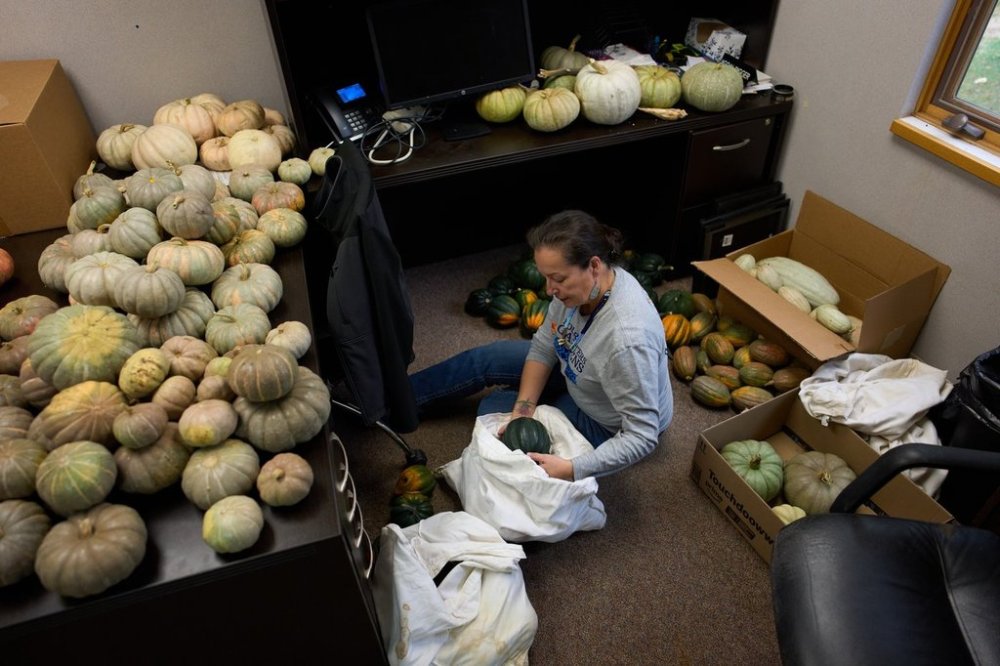World
Tribal College Leaders Voice Concerns Despite Funding Increase

In New Town, North Dakota, tribal college leaders are expressing unease about the future of funding for their institutions, despite a recent increase in financial support from the U.S. government. As leaders navigate uncertain federal commitments, they emphasize the importance of education rooted in Indigenous culture.
On a brisk morning, Ruth De La Cruz surveyed the Four Sisters Garden, searching for Hidatsa squash. For her students in the food sovereignty program at the Nueta Hidatsa Sahnish College, the squash may represent an academic assignment. For De La Cruz, it symbolizes the enduring legacy of her ancestors’ labor. “There’s some of the squash, yay,” she exclaimed, discovering the small gourds basking in the sun.
The garden reflects the Hidatsa tradition of cultivating four crops together—squash, corn, sunflower, and beans. This agricultural practice not only sustains the community but also fosters a connection to cultural heritage. The college, operated by the Mandan Hidatsa Arikara Nation, is one of over three dozen tribal colleges and universities (TCUs) that faced potential funding cuts under the administration of former President Donald Trump.
Despite a funding increase announced by the U.S. Department of Education in September 2023, which raised financial support for TCUs by over 100%, many college leaders remain apprehensive. This increase, while welcomed, comes on the heels of significant federal budget cuts affecting other educational institutions, including those serving Hispanic students.
Advocates worry that the federal government’s financial commitments, stemming from historical treaties, could be further diminished. “This is not just a haven for access to higher education, but also a place where you get that level of culturally, tribally specific education,” De La Cruz said. The obligation of the U.S. government to uphold the health, education, and security of Indigenous peoples is rooted in treaties and legal agreements, known as trust responsibilities.
Twyla Baker, president of Nueta Hidatsa Sahnish College, underscored the importance of these obligations. “We prepaid for all of this,” she remarked, emphasizing that the government must honor its promises to protect Indigenous knowledge for future generations. Baker highlighted that ancestors carried vital cultural knowledge, which she feels compelled to preserve and pass on.
The educational pillar of these trust responsibilities encompasses numerous initiatives, including hundreds of elementary schools funded by the U.S. Bureau of Indian Education and specialized programs at TCUs. However, many federal funding sources have faced reductions, causing concern among leaders.
According to the American Indian Higher Education Consortium, which advocates for TCUs, funding cuts from agencies like the National Science Foundation and the U.S. Department of Agriculture have compounded the challenges. In 1994, Congress designated tribal colleges as land grant institutions, enabling access to federal funding, but TCUs do not receive the same financial benefits as other land grant universities.
Despite the recent funding increase, Ahniwake Rose, president of the consortium, cautioned against complacency. “I don’t want people to think because we got this increase in funds that all is OK, because it’s still precarious,” she noted. The uncertainty surrounding federal budgets complicates long-term planning for programs and staffing at TCUs.
Leander McDonald, president of the United Tribes Technical College in Bismarck, North Dakota, echoed these sentiments, expressing concern about the sustainability of funding. “How long is the storm going to last?” he questioned, reflecting on the difficulties in budgeting amid fluctuating federal support.
In September 2023, a report from the American Indian Higher Education Consortium revealed that TCUs contributed approximately $3.8 billion to the national economy through increased student revenue and social savings related to health and justice. This economic impact reinforces the essential role of TCUs in both education and community development.
Students at TCUs, such as Zaysha Grinnell from the MHA Nation, benefit from programs that emphasize Indigenous knowledge. Grinnell, enrolled in the Native American Studies program, highlighted the unique educational experience offered at her college. “You can’t get that anywhere else,” she stated, underscoring the significance of learning from elders who pass down cultural traditions.
Mike Barthelemy, head of the Native American Studies program at the college, noted the historical erasure of Indigenous cultures and languages. “You can look around us in any direction for hundreds of miles, and those are ceded territories,” he said, emphasizing the ongoing relevance of trust responsibilities in addressing historical injustices.
As tribal college leaders continue to advocate for stable funding, the future of education and cultural preservation for Indigenous students hangs in the balance. Their collective efforts highlight the necessity of honoring commitments made to Indigenous nations, ensuring that future generations can access both higher education and their rich cultural heritage.
-

 Politics2 weeks ago
Politics2 weeks agoSecwepemc First Nation Seeks Aboriginal Title Over Kamloops Area
-

 World4 months ago
World4 months agoScientists Unearth Ancient Antarctic Ice to Unlock Climate Secrets
-

 Entertainment4 months ago
Entertainment4 months agoTrump and McCormick to Announce $70 Billion Energy Investments
-

 Lifestyle4 months ago
Lifestyle4 months agoTransLink Launches Food Truck Program to Boost Revenue in Vancouver
-

 Science4 months ago
Science4 months agoFour Astronauts Return to Earth After International Space Station Mission
-

 Technology3 months ago
Technology3 months agoApple Notes Enhances Functionality with Markdown Support in macOS 26
-

 Top Stories1 month ago
Top Stories1 month agoUrgent Update: Fatal Crash on Highway 99 Claims Life of Pitt Meadows Man
-

 Sports4 months ago
Sports4 months agoSearch Underway for Missing Hunter Amid Hokkaido Bear Emergency
-

 Politics3 months ago
Politics3 months agoUkrainian Tennis Star Elina Svitolina Faces Death Threats Online
-

 Politics4 months ago
Politics4 months agoCarney Engages First Nations Leaders at Development Law Summit
-

 Technology4 months ago
Technology4 months agoFrosthaven Launches Early Access on July 31, 2025
-

 Top Stories3 weeks ago
Top Stories3 weeks agoFamily Remembers Beverley Rowbotham 25 Years After Murder





















